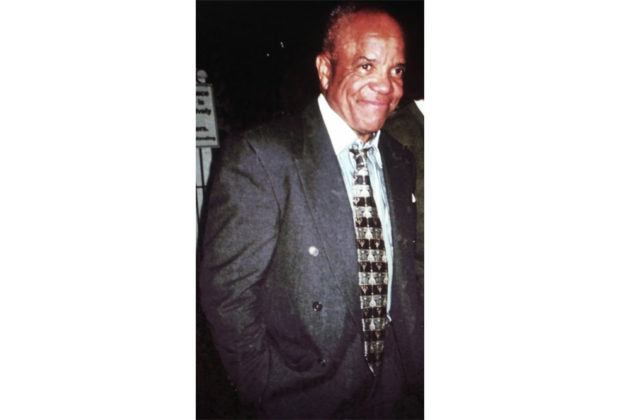Motown Founder Berry Gordy To Be Honored at the 44th Kennedy Center Honors For Lifetime Achievements
The John F. Kennedy Center for the Performing Arts today announced the selection of five Honorees who will receive the 44th Kennedy Center Honors for lifetime artistic achievements.
Recipients to be honored at the annual national celebration of the arts in Washington, D.C. are: operatic bass-baritone Justino Díaz, Motown founder, songwriter, producer, and director Berry Gordy, Saturday Night Live creator Lorne Michaels, legendary stage and screen icon Bette Midler, and singer-songwriter Joni Mitchell.
“The Kennedy Center Honors celebrates luminaries whose art and creativity have enriched us beyond measure,” expressed Kennedy Center Chairman David M. Rubenstein.
“This year’s Honorees represent the unifying power of the Arts and surely remind us of that which binds us together as human beings. These artists are equal parts genius, inspiration, and entertainment,” said Kennedy Center President Deborah F. Rutter.
“After the challenges and heartbreak of the last many months we celebrate 50 years of the Kennedy Center in D.C on December 5th, feting these extraordinary people. We look forward to shaping an even more exciting Honors program and broadcast with CBS-TV.”
Visionary music producer and songwriter Berry Gordy brought the quintessential soulfulness of Detroit into every home in America, elevating the Motown sound to become a national treasure.”
“Growing up in Detroit, I was not only Black but the ‘black sheep’ of my family,” said Berry Gordy. “I was a failure at everything I did until I was 29 years old. Throughout the years I’ve been blessed with many wonderful memories, but this—the Kennedy Center Honors—is one that will be forever in my heart.”
A man of vision, drive, talent, and determination, Gordy became a boxer, songwriter, producer, director, entrepreneur, and founded Motown—the hit-making enterprise born in Detroit, Michigan.
Berry discovered and nurtured the careers of Smokey Robinson and the Miracles, Diana Ross and the Supremes, Stevie Wonder, Michael Jackson and the Jackson 5, Marvin Gaye, Lionel Richie and the Commodores, Martha Reeves & the Vandellas, the Temptations, Gladys Knight & the Pips, and other music greats and is responsible for the “Motown Sound” that reached out across a racially divided, politically and socially charged country, to transform popular music.
Actively involved in the Civil Rights movement, he released the recorded speeches of Dr. Martin Luther King, Jr. Expanding to films, his movies include Mahogany, his directorial debut, and Lady Sings the Blues, which garnered five Academy Award® nominations.
Over the years, Gordy has received four honorary doctorates and numerous awards and inductions including: Martin Luther King, Jr. Leadership Award, Rock and Roll Hall of Fame, Hollywood’s Walk of Fame, the naming of Berry Gordy Square at Sunset Blvd and Argyle Avenue in Hollywood, the Rainbow Coalition’s Man of the Millennium Award, the Rhythm and Blues Foundation’s Lifetime Achievement Award, the Grammy President’s Merit Award, the National Medal of Arts presented by President Barack Obama, and the Songwriters Hall of Fame Award.
Berry Gordy’s unparalleled contribution to music and popular culture is chronicled in his autobiography, To Be Loved: The Music, The Magic, The Memories of Motown. It is the basis for his play, Motown the Musical, which premiered on Broadway in 2013, garnering four Tony nominations, and The New York Times calling it Broadway’s “biggest box office hit of the year.”
2019 marked a year-long celebration of Motown’s 60th Anniversary, with the CBS special Motown 60: A Grammy Celebration, the release of his critically acclaimed documentary, Hitsville: the Making of Motown—and wrapping up the year in Detroit where it all began, with Mr. Gordy being awarded the Motown Museum’s Legacy Award at the Motown 60 Weekend and Hitsville Honors.
Berry Gordy III was born November 28, 1929, in Detroit, Michigan. A former boxer and assembly line worker, and veteran of the Korean War, Gordy, in 1955, ran a jazz record store, his first foray into the music business. Although the shop failed, he didn’t give up. Berry wrote songs, and got his first break when Jackie Wilson cut some of his compositions, including “Reet Petite,” “That’s Why (I Love You So),” and “Lonely Teardrops.”
Gordy’s sisters Anna and Gwen, along with Billy Davis, started the Anna label, which scored a major success with Barrett Strong’s “Money (That’s What I Want)” in early 1959. Gordy was involved with the Anna label, launched the Tamla label and then Motown itself, with Berry Gordy at the helm, soon followed.
By the early ‘70’s, having outgrown its Hitsville USA outpost in Detroit, Gordy moved the Motown operation, now a, influential entertainment complex and the largest black-owned corporation in the country, to Southern California.
Gordy eventually withdrew from the day-to-day operations, and finally, in 1988, he sold his brainchild to a major corporation, MCA. Motown shifted ownership to the PolyGram group of companies, now known as Universal Music Enterprises. Gordy is still involved with Jobete Music, the publishing company that houses the globally-recognized copyrights.
In 1994, Warner Books published Berry Gordy’s autobiography To Be Loved: The Music, The Magic, The Memories of Motown. The title is taken from a song Gordy penned for “Mr. Excitement,” Jackie Wilson.
Below is an excerpt from an interview I conducted with Gordy, originally published in 1994 in HITS magazine:
HK: Motown Records began with 45 rpm records. Then the album format, eventually 8-track tapes, cassettes and now compact discs. Were you personally impacted by the growth of the LP market?
BG: Not very much. We were about producing songs that were great. And so a lot of the producers who would be coming to our Friday morning meetings, they would say when the song wasn’t that great. “Oh, that’s an album tune. That’s just going on the album.” I’d say, “No. No. There are no album tunes. Every tune has to stand on its own.”
We didn’t look at album tunes as such. We would pick tunes that were hits and that’s why they would go on albums and pull out a hit here, a hit there, you know? So it didn’t impact us that there were albums and we had departments and all that stuff. But as far as recording, unless there was a concept album and things like that, we would say there are no album tunes. We’d say that all the time.
HK: What about compact discs?
BG: They were cleaner. When we were first told about them we couldn’t get them. I mean, no one was manufacturing them, you’d have to wait, and it was a problem. And the cost was just incredible and you had to order so many before you even got them. We were just a small company and the CD manufacturers, and all these new things, were things that confused us more than anything else. Because we were about hit records and one record at a time, and different producers were doing different things, so I don’t know a lot about how they affected me emotionally or stuff like that.
Actually, we made money on every new format that came out because it was a new configuration. So they’d buy all over again, whatever it was. Then you have software, that’s what it is now. That’s why Jobete is so important to us, because of the songs and its software. Whatever it is, a great song is a great song. That’s all it is. And whatever configuration comes, we don’t worry about the configuration. We worry about if we have the product. And that’s what we’re doing going into Jobete saying, “Hey, before we do anything else, let’s make sure we have great songs. Make sure these songs are still great. Let’s look at all the other 95 per cent of our songs.”
‘Cause there’s great songs that were great but they were produced wrong, or maybe the wrong singer, or maybe this or maybe that. But the quality is still there. So let’s look at all that. So that’s what we’re doing now and that’s fun, because I started as a songwriter. I love songs, so you know, that’s a hobby.
And so it wasn’t me that was the genius. If I was a genius of anything, it was bringing out the genius of others, because if they reach their potential then I had felt that maybe I could reach mine. So in bringing out the genius in others and finding it, sure, it was hard and tough, but your clues will tell you. And then, stopping them from focusing on other things other than what they’re doing.
HK: I know, but I bet a lot of people reading this conversation might not be aware that you had a life from age 18-29 before Motown began. You talk about it in the book. The 3D Record Mart, the automobile plant and writing songs. A ten year period where being in the real world probably paid advantages later.
BG: The real world. I learned a lot. If I hadn’t worked in the factory at Lincoln-Mercury I wouldn’t have had the assembly line idea. I wouldn’t have written a lot of songs. I wouldn’t have been locked into a place where I had to write a lot of thoughts I had. I saw what the real world was like and I saw what I wanted and what I didn’t want.
HK: What was your first impression of William “Smokey” Robinson?
BG: Well, Smokey Robinson, my first impression was he was great, a great poet, but he didn’t know how to really write songs, or put songs together. When he learned how to put stuff together and he really understood, Smokey was incredible. When I turned down his first 100 songs, he got more excited with every song. I said, “This guy has to be either crazy or one of the most special people I’ll ever meet.” He was incredible. He turned out to be one of the most special people I ever met.
HK: And with an angelic voice
BG: Oh, yes. Pure. And then, he got it and understood it. So now Smokey has succeeded at the cycle of success. It takes a lot of character, because you are tempted along the way. The cycle of success is a vicious cycle. It takes you into places. People offer you things never offered before. To succeed and be successful is tough so it takes a lot of character. You got to keep your same values. So Smokey has done that. The Four Tops have done that. And most of the Motown artists have it drilled into them and they were all very tight.
HK: The Four Tops?
BG: The epitome of loyalty, integrity, class. They’ve been together for 40 years, the same four members. That is unheard of, impossible, and I just admire them so much. I admire them the most of any of the artists.
HK: The Temptations?
BG: Legends. They’ve managed to keep their look and their style all these years and they’ve changed members constantly, but Otis and Melvin have done just an amazing job of finding one major talent after another. Because they are legends, people want to be with the Temptations, and they have proven that the group is stronger than any of its parts. I don’t care how great that part was, the Temptations are an institution.
HK: One of my favorite Motown/Jobete records is the Supremes’ “Up the Ladder to the Roof.” Jean Terrell sings lead on it.
BG: Frank Wilson is the producer. That’s one of those 95 percent.
HK: Diana Ross?
BG: Diana…Special, magic, sensitive. When she does a song like “Somewhere” in front of an audience she still cries, I mean, I’ve never seen her do “Somewhere” without crying. In fact, we used to stop her from doing it every night in the week. The Bernstein song from West Side Story. She was so dramatic and then she did the second ending and it was too much emotionally. She’s so emotional and she gives all to her audience and she is sincere about it and serious about it.
HK: Marvin Gaye?
BG: The truest artist I’ve ever known. Whatever he was going through in his life he put on records. I mean I’ll hear Marvin Gaye’s What’s Going On album. He had three voices: Marvin on top of Marvin on top of Marvin. Just incredible. So if you want to know Marvin just listen to one of his records.
HK: Stevie Wonder?
BG: Innovative. The most innovative person that I’ve ever known. But also unique with his tones and his voice quality and all that. He was as close to genius, and I don’t like to use the word genius, you know. Marvin could have been a genius. I don’t like to throw it around, but Stevie is one of those kind of special, special, special people that had a sound, and he’s quick. He’s creative and he can make up something very quick.
HK: And he’s involved in technological developments.
BG: That’s what I’m saying. Contraptions. He would take technology. He was the first in technology. He’s an innovator.
HK: Michael Jackson?
BG: Greatest entertainer in the world and one of the smartest people and businessmen in the world. He conducted his own career, basically. He knew what he wanted. And from nine years old he was a thinker. And I called him “Little Spongy,” because he was like a sponge and he learned from everybody.
He not only studied me, but he studied James Brown, Jackie Wilson, Marcel Marceau, Fred Astaire…Walt Disney. And he bought the Beatles’ catalog. Michael is nobody’s fool. Very bright. Very smart.
HK: The Holland, Dozier and Holland production and songwriting team?
BG: H-D-H was phenomenal. They came up with hit after hit. They started a thing. They had a lock on the Supremes and they took them, and did stuff on Marvin. H-D-H was absolutely brilliant. The three of them were different and they all complemented each other.
Eddie (Holland) did mostly vocals, Brian (Holland), I thought was the most talented, creative person. He was my protégé for many years. I thought Lamont(Dozier) was also a good writer, and he was good on backgrounds and this and that and so forth. But Brian would do something like he would play and sing and create something and all he would give ‘em was, like, “sugar pie honey bunch,” and pass it on. So they had their own assembly line. And they were tremendous.
HK: The producer and songwriter, Norman Whitfield?
BG: Norman to me was probably the most underrated of all the producers, because he was producing by himself. And he would deal with different sounds, different beats, change with the times and write his stuff, and also Barrett Strong would work with him as a writer on many of his things. Norman was innovative and he had fire. And he had a different kind of style.
His beat was different and could go from “Cloud Nine,” “Psychedelic Shack,” “Papa Was A Rolling Stone,” to “Just My Imagination.” He was sensitive and I think he could do so many different types of things. Then he’d come right back with “War” and then “Ain’t Too Proud To Beg.”
He could take one chord, like on “Papa Was A Rolling Stone,” and play the same chord and do all these different beautiful melodies and things that many people could not really imagine this guy doin’. And I would watch him and he did it all by himself as a producer. He would work with five guys in the Temps and he would change leads on each one. He would pick the right lead for the right song, ya know, and he’d utilize all five of those leads in a song that was just incredible.
When I listen to ‘em today, now that I have time to listen to ‘em, I’m saying, “Wow! This guy was probably the most underrated producer we had.
Photo by Jim Roup
Harvey Kubernik is the author of 20 books, including Leonard Cohen: Everybody Knows, Neil Young: Heart of Gold, Canyon Of Dreams: The Magic And The Music Of Laurel Canyon and Turn Up The Radio! Rock, Pop and Roll In Los Angeles 1956-1972.
Sterling/Barnes and Noble in 2018 published Harvey and Kenneth Kubernik’s The Story Of The Band: From Big Pink To The Last Waltz. For October 2021 publication the duo wrote Jimi Hendrix: Voodoo Child for Sterling/Barnes and Noble.
Otherworld Cottage Industries in 2020 published Harvey’s book, Docs That Rock, Music That Matters, featuring interviews with D.A. Pennebaker, Chris Hegedus, Albert Maysles, Murray Lerner, Morgan Neville, Dr. James Cushing, Curtis Hanson, Michael Lindsay-Hogg, Andrew Loog Oldham, Dick Clark, Ray Manzarek, John Densmore, Robby Krieger, Travis Pike, Allan Arkush, and David Leaf, among others.
Kubernik’s writings are in several book anthologies, most notably The Rolling Stone Book Of The Beats and Drinking With Bukowski.
This century Harvey wrote the liner note booklets to the CD re-releases of Carole King’s Tapestry, Allen Ginsberg’s Kaddish, Elvis Presley The ’68 Comeback Special and The Ramones’ End of the Century).
Kubernik is currently working on a female-themed manuscript Sisters In Song.
In November 2006, Harvey was a speaker discussing audiotape preservation and archiving at special hearings called by The Library of Congress and held in Hollywood, California.
During 2020 Harvey Kubernik served as a Consultant on the 2-part documentary Laurel Canyon: A Place in Time directed by Alison Ellwood which debuted on EPIX television.















